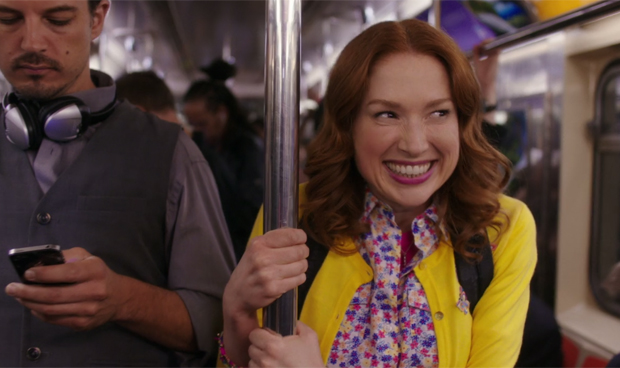
The unbreakable Kimmy Schmidt
A lot of people tell me I’m doing really well. I mean, a lot. I appreciate it, because it’s generally said with admiration or, I think, in the spirit of being encouraging, but after a while it makes me feel a little bit strange. What does it mean to do well when your husband died by suicide? I’ve always been an overachiever, an eager beaver, one of the first kids in the class to have their hand up, who was motivated first by gold stars and then by A-stars. Do I want extra credit for doing well in the face of deep tragedy? I don’t think there’s a curve you can be graded on when it comes to loss.
Two months ago today, Kieran died. He was probably nearly three hours dead by the time of day I’m writing this, though I’ll never know the exact moment he was gone. There are a lot of things about all this I will never know for sure, which is one of the great pains of losing someone by suicide. There are so many great gulfs of answered questions, deep holes you could lose yourself in quite easily.
The premise of tv show The Unbreakable Kimmy Schmidt is that the twenty-nine year old titular heroine is rescued from the clutches of a doomsday cultist who has kept her and three other women in an underground bunker since she was fourteen years old. It is, strangely enough, a comedy. The show’s schtick wore thin fairly quickly for me, but I found Ellie Kemper’s portrayal of Kimmy incredibly engaging. Kimmy is a relentless optimist. The show encourages you to laugh at that, often makes a joke out of Kimmy’s Pollyanna-ish response to her terrible past and uncertain future, but – at least in my reading – never questions that this is an innate element of Kimmy’s personality, and that it is a key to her survival. The show also lets her have moments of deep rage and sadness which are, despite the slapstick absurdity of most of the programme, deeply moving. Kimmy’s sunniness is not a painted facade over these feelings, though, which I think would be the direction many tv shows would have taken and would have made her a less compelling character in the name of grimdark “realism”. Part of Kimmy is always in the bunker. But, more importantly, when Kimmy was in the bunker, a great part of her soul was still outside, looking up at the sun.

All of which is to say, I suppose, that a lot of the way I am responding to loss is just because of who I am. If I’m doing well, it’s because my default state is turning my face upward to the sun. I don’t see that as a virtue, but rather as good fortune. I know many wonderful people who work very hard every day to keep themselves out of the bunker. There are ways you can nurture a “positive mindset”, but what we don’t like to acknowledge is that a lot of it comes down to a serendipitous combination of brain chemistry and personal history.
Today, walking home from dropping my daughter off at school – a walk Kieran will never take again – I thought about my old favourite poem, Ash Wednesday, about how throughout my adult life the line shall these bones live? has resonated deeply within the marrow of my own bones, in the hollow spaces of my skull, in the depths of my heart and gut. That in every moment of my life my answer to that question has always been yes. Yes. And when I got home I sobbed, briefly but loudly, for the strange painful injustice that I am a survivor and somehow Kieran was not. There is no value judgment in that. He was not a coward, he was not weak, but he felt broken – and in a significant way he was. Something in his dear good mind broke, that place whose answer to the question of whether we keep going on is instinctively yes. It happened to him once before, two months before we got married. We were able to fix him then, and of course a good part of the torture of all this is thinking maybe we could have fixed him again. But you know, maybe we couldn’t. So much of the media narrative around suicide is simplistic, a relentless optimism of just talk about it, just reach out. It is written by people who haven’t been in the bunker. Sometimes it’s not that people can’t remember the feel of the sun; it’s that they know even standing in the full glare of it they will still feel six feet underground.

Another reason I cried, I know, is something akin to guilt. I feel no guilt over having had joy in these past two months. I have laughed and smiled quite a lot, actually, in these nine weeks. But I do feel a sort of guilt in my instinctive knowing that I will get through this – that I am getting through this – and that my life will continue in ways that are good. So many people I see in online bereavement groups are frozen in time with their grief, and I don’t want that for myself; more than that, I know for me it’s not possible. It’s not because I’m “doing well”, it’s because there is in me a deep and thus far unconquerable urge to still fly seaward, seaward flying, a part of me that can almost feel selfish, because the way I am socialised to be a woman and the way we are culturally socialised to treat grief is to applaud “putting a brave face” on things but to feel a thin-lipped disapproval for someone who “moves on”.
I can’t move on from Kieran’s death in the sense of packing up my bags and going to a new place, leaving the old one behind me. Someone said, in the early days of his death, I should be careful not to let what has happened “define” me. It was kindly meant, I think, and from someone who has experienced a loss of similar magnitude, if not by the same means. But of course it defines me. Loving someone for a third of my life defines me. Losing him does as well. And it’s not in my nature – as those of you who are long-time readers know all too well! – to do anything except wear my heart on my sleeve, But if I seem alright, I probably am. It’s not putting on a brave face – at least not most of the time. I am at times both very happy and poleaxed by grief. I have been given a new life I never expected and didn’t want. I was so very happy with my old one. Sometimes my whole body cries out I want it back. But I can’t. And I won’t be like the people I see in support groups who say they will never feel whole again. That’s not because I’m better than them, but because I have been very fortunate to always feel whole, in and of myself. There is a great gaping hole in me because of this trauma I’m living through, but even at the very worst part of its pain I have never felt that I was not whole because of it. Bruised and bleeding, heartstruck and dazed, I am, still, always, relentlessly, seaward-flying, in the direction of the evening sun.
I will keep flying, but I’ve never said I want to do it alone. If you’re unsure how you can usefully support me, I wrote some suggestions here.

I don’t know what sorts of books you enjoy/ find helpful etc. but at some point you may want to read Maria Tumarkin’s book Axiomatic published by the excellent Fitzcarraldo Press. It is difficult to describe but it is a collection of extended essays recounting the aftermath of trauma. I particularly enjoyed reading about the Holocaust survivor who some people found difficult to take – too loud, too colourful, generally’ too much’. Hope this isn’t an unhelpful suggestion, but while it is quite a while since I read it, I just thought you might find it gives some interesting perspectives. All best wishes to you and your daughter.
thank you!
Thanks for writing and sharing this.
This is so beautifully written, Rachel. Thinking of you lots ❤
Thank you for sharing. I’m so sorry for your loss.
I’ve only learnt of Kieran’s death today, from my parents. I grew up living next door but one to him and attended the same schools. We haven’t been in touch since school days but I remember him with fondess; such an sharp mind with a kind soul.
I’ve enjoyed reading all about his life and achievements through this blog and others I’ve found along the way.
I wish he could have been with you longer.
Thank you x
One of the things I learned working with those who are suffering debilitating mental illness requiring guardianship of some level (usually schizophrenia as a baseline…) my major takeaway was how people deal with trauma in one of two ways. In my head I called them “sunny” and “stormy”. Sunny people… take things as they come. Bad and good… its… just… stuff that happens. They have feelings… and they will feel good or bad or elated or deflated… but they can move on from it. Stormy were the people who LIVED in the past… in the trauma (or the success) and can’t accept that things have changed. They KNOW things have changed, but they can’t *accept* it. They are consistently re-traumatized by their past… or, the loss of what ‘they had’.
It wasn’t the size or depth of the trauma that mattered… it was whether they lived in that trauma, holding on to the darkness and the losses… forever, or whether they had a natural ability to leave that cave, eventually. It isn’t *hope* or *optimism* that does it… it’s something else. It’s a *habit* of thriving…. no matter what.
Thank you for sharing. Ive just lost my husband of 15 years in Aug and it’s
been devastating. Though there is grief, I have experienced moments where I find myself smiling (usually by the antics of my toddler). I too want to be like you to take baby steps forward in this new solo journey.
I’m sorry for your loss x